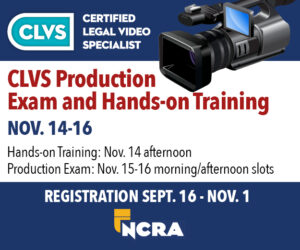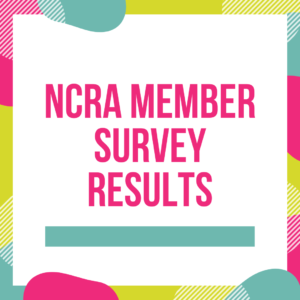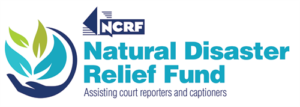
This page is no longer being updated. For the most current information NCRA has available, NCRA members can visit the Remote Notarization section on NCRA.org/SONAR.
Please note that each state’s notarization laws are different and may only apply to specific proceedings. Please check with your State Notary, Secretary of State, or other regulatory agency for your state’s specific remote notarization or oath administration laws. Lastly, the information provided is not intended, nor should it be construed, to be legal advice. Members with particular needs concerning the specific issues mentioned should seek the guidance or retention of competent counsel. If you have any additional updates or changes to this information, please contact NCRA Director of State Government Relations Jocelynn Moore at jmoore@ncra.org.
Faced with both the need to practice safety in this health crisis and yet the need to allow justice to continue its work, many court reporters are attempting to make the remote office accessible for courtrooms and depositions. Keep in mind that for some states and for some officials, their ability to swear in a witness is embedded within their licenses or within their official duties as a court reporter.
According to the National Notary Association, “remote notarization” happens when a signer personally appears before the Notary at the time of the notarization using audio-visual technology over the internet instead of being physically present in the same room. Remote online notarization is also called webcam notarization, online notarization, or virtual notarization.
Congress is currently considering a bill, the “Securing and Enabling Commerce Using Remote and Electronic Notarization Act of 2020,” that was introduced by U.S. Senators Mark Warner of Virginia and Kevin Cramer of North Dakota on March 18, 2020. If enacted, the bill will authorize remote online notarizations nationally. For information, please visit: https://www.congress.gov/bill/116th-congress/senate-bill/3533/text.
Several states have implemented changes to laws in the past few months which allow for remote notarization, and we have attempted to gather that information for you here:
Alabama – Effective March 24, 2020, through April 16, 2020, official court reporters, special roving court reporters, special court reporters, supernumerary court reporters, and freelance court reporters qualified to administer an oath in the state of Alabama to a witness in a deposition or court proceeding or trial may swear a witness remotely by audio-video communication technology if the deposition or court proceeding or trial is conducted by audio-video communication equipment that allows the court reporter and the witness simultaneously to view and orally communicate with each other, provided that the court reporter can positively identify the witness.
Alaska – Can swear witnesses telephonically since the 1990s.
California — Effective March 27, 2020, the following statute is suspended: Code of Civil Procedure section 2025.310, subdivision (b), to the extent that subdivision limits a court’s authority to provide that a party deponent may appear at a deposition by telephone.
Colorado — Effective March 27, 2020, until 30 days from March 27, 2020, unless extended further by Executive Order. The Executive Order temporarily suspends the requirement that the individual making a statement or executing a signature appear personally before a notarial officer, as set forth in C.R.S. § 24-21-506. This temporary suspension does not apply to any notarial act required by Title 1 of Colorado Revised Statutes. Governor Polis authorized the Colorado Secretary of State, consistent with the Secretary of State’s rulemaking authority under C.R.S. § 24-21-527(1)(a)-(f), to promulgate and issue temporary emergency rules to:
- Authorize notarial officers to perform notarizations where a person appears before a notarial officer remotely, by real-time audio-video communication; and
- Establish the standards and processes necessary to allow remote notarizations, including rules regarding authentication, verification of identity, and audio-video recording.
Connecticut – Effective March 24, 2020, through June 23, 2020, all relevant state laws and regulations are hereby modified to permit any notarial act that is required under Connecticut law to be performed using an electronic device or process that allows a notary public commissioned by the Connecticut Secretary of the State and a remotely located individual to communicate with each other simultaneously by sight and sound (“Communication Technology”), provided that certain conditions are met.
Florida
Georgia – Currently, there is no clear legal authority expressly barring a court reporter from administering an oath remotely, nor is there authority expressly permitting it. Remote depositions, in general, are permitted by Georgia’s Civil Practice Act. “[A] deposition may be taken by telephone or other remote electronic means only upon the stipulation of the parties or by order of the court. For purposes of the requirements of this chapter, a deposition taken by telephone or other remote electronic means is taken in the state and at the place where the deponent is to answer questions.” OCGA § 9-11-30(b)(4). However, the Act does not address whether a court reporter must be physically present with a witness in order to swear the witness in. No appellate legal authority interpreting this code section to impose a live swearing-in requirement could be located; however, no legal authority interpreting it to bar remote swearing-in was located either.
Idaho
Illinois — Effective March 26, 2020, Governor Pritzker ordered that during the duration of the Gubernatorial Disaster Proclamation related to the outbreak of COVID-19, the requirement that a person must “appear before” a Notary Public commissioned under the laws of Illinois pursuant to the Illinois Notary Act, 5 ILCS 312/6-102, is satisfied if the Notary Public performs a remote notarization via two-way audio video communication technology, provided that the Notary Public commissioned in Illinois is physically within the State while performing the notarial act and the transaction follows the guidance posted by the Illinois Secretary of State on its website. Additionally, it was ordered that during the duration of the Gubernatorial Disaster Proclamation related to the outbreak of COVID-19, any act of witnessing required by Illinois law may be completed remotely by via two-way audio-video communication technology, provided that certain conditions are met.
Indiana — Effective March 31, 2020, until further order by the Indiana Supreme Court. Notaries and other persons qualified to administer an oath in the State of Indiana may swear a witness remotely by audio-video communication technology, provided they can positively identify the witness. All rules of procedure, court orders, and opinions applicable to remote testimony, depositions, and other legal testimony, that can be read to limit or prohibit the use of audio-video communications equipment to administer oaths remotely, are suspended.
Iowa — Effective March 22, 2020, until 11:59 P.M. on April 16, 2020, unless sooner terminated or extended in writing by Governor Reynolds. The Governor, pursuant to Iowa Code § 29C.6(6) suspended the personal appearance requirement in Iowa Code § 9B.6, but only to the extent that the notarial act complies with the requirements of section 6 of 2019 Iowa Acts chapter 44 (Senate File 475) and communication technology. Additionally, the Governor, pursuant to Iowa Code § 29C.6(d) and Iowa Code § 135.144(3), and in conjunction with the Iowa Department of Public Health, temporarily suspended the regulatory provisions of Iowa Code §§ 144B.3, 633.279, and 633B.105, to the extent that they require the physical presence of a testator, settlor, principal, witness, or other person, if the person is present in a manner in which the witness or other person can see and hear the acts by electronic means, such as video conference, Skype, Facetime, Zoom, or other means, whether or not recorded.
Kentucky — pending legislation
Maine – Effective March 25, 2020 until further ordered by the State of Maine Supreme Judicial Court. An officer or other person before whom a deposition is to be taken is hereby authorized to administer oaths and take testimony remotely, so long as that officer or other person can both see and hear the deponent via audio-video communication equipment or technology for purposes of positively identifying the deponent. In addition, all parties are reminded that, “[u]nless the court orders otherwise, the parties may by written stipulation (1) provide that depositions may be taken before any person, at any time or place, upon any notice, and in any manner and when so taken may be used like other depositions, and (2) modify the procedures provided by these rules for other methods of discovery.” M.R. Civ. P. 29. If the parties so stipulate to the person before whom the deposition is to be taken, that person has the authority to administer oaths.
Maryland — Effective March 30, 2020, until the termination of the state of emergency and the proclamation of the catastrophic health emergency has been rescinded, except as may be rescinded, superseded, amended, or revised by additional orders. The order issues guidance to notaries public on the use of communications technologies that permit the notary to see and hear the person signing a document in realtime.
Michigan — pending implementation
Minnesota – Effective January 1, 2019, the Minnesota Legislature enacted remote online notarization pursuant to Minnesota Statutes 358 and 359, allowing a notary public who is physically located in this state to perform a remote online notarial act as defined in Minnesota Statutes 358.645.
Mississippi – All persons qualified to administer an oath in the State of Mississippi may swear a witness remotely by audio-video communications equipment for purposes of readily identifying the witness until otherwise ordered by the Supreme Court of Mississippi.
Missouri – Effective March 25, 2020, until otherwise further ordered by the Supreme Court of Missouri. The Court hereby suspends any local or Missouri Supreme Court rule that may be interpreted to require administering any oath or affirmation in-person when such oaths or affirmations can be administered remotely by available technologies, including videoconferencing or teleconferencing, and is not otherwise prohibited by any statutory or constitutional provision.
Montana – Effective October 1, 2019, Montana Notaries are permitted to perform remote notarizations for signers outside the state.
Nevada
New Hampshire — Effective March 23, 2020. Governor Sununu in Emergency Order #11, Pursuant to Executive Order 2020-4, has temporarily authorized the authority to perform secure online notarization.
New York – Effective March 7, 2020, through April 18, 2020, any notarial act that is required under New York State law is authorized to be performed utilizing audio-video technology provided that certain requirements are met. As of 2017, the New York Department of State, with regard to CPLR 3113(d), stated that “…with respect to civil depositions, a notary may under the specific provisions of Article 31 of the CPLR and in compliance therewith, swear in a remote witnesses. …”
North Dakota – The webcam notarization law took effect August 1, 2019. The statute permits the Secretary of State to publish rules for remote notarization, but the Secretary of State is not required to do so.
Ohio – The Ohio Notary Public Modernization Act took effect September 2019. An online notarization is permitted by an Ohio notary public who has been authorized by the Ohio Secretary of State’s office to perform online notarizations. With regard to remote oath administration during depositions, the Ohio Rules of Civil Procedure contemplates the use of remote depositions (See Ohio R. Civ. P. 30(b)(6)). However, the rules do not state that the oath has to be administered in person. The Ohio rules regarding notaries public (see Ohio Revised Code 147) do not address the in-person administration of oaths at a deposition.
Oklahoma
Pennsylvania – Effective March 21, 2020, the requirement of physical presence of notaries who are court reporters/stenographers participating in criminal, civil, and administrative proceedings is suspended as pertaining to notarial acts and oaths of affirmations and will only last the duration of the declared disaster emergency.
South Dakota – The state’s remote notarizations are currently limited to paper documents only and signers for remote notarizations may only be identified through the Notary’s personal knowledge.
Tennessee
Texas – The Texas Supreme Court issued Emergency Order No. 1 allowing for all participants in a civil or criminal proceeding – including a Texas Certified Shorthand Reporter – to appear remotely until it expires on May 8 or is extended.
Vermont – Notaries public holding a commission to perform notarial acts in Vermont may perform a Remote Notarial Act while physically located in Vermont and only under specified conditions.
Virginia
Washington — Effective March 24, 2020, until midnight on April 26, 2020, Senate Bill (SB) 5641, An Act Relating to Electronic Notarial Acts by Remotely Located Individuals — which was to initially take effect October 1, 2020 — is to take effect immediately, from March 27, 2020, until midnight on April 26, 2020.
West Virginia – Effective March 25, 2020. The statutory regulation with respect to the provisions of the Code applicable to court reporters and other notaries, the requirements of personal appearance for a notarial act that relates to a statement made in or a signature executed on record is suspended for the duration of the State of Emergency.
Wisconsin – Effective March 25, 2020 until April 30, 2020. Pursuant to the Supreme Court of Wisconsin’s administrative and superintending authority, court reporters qualified to administer an oath in the State of Wisconsin may administer an oath to a witness at a deposition remotely via audio-visual communications technology from a location within the State of Wisconsin, provided the person administering the oath can see and hear the person and can identify the witness. It is further ordered that if a witness is not located within the State of Wisconsin, the witness may consent to being put on oath remotely via audio-visual communication technology by a court reporter qualified to administer an oath in the State of Wisconsin pursuant to this order. It is further oredered that (1) this order does not alter the ability of parties, by written stipulation, to provide that depositions may be taken before any person, at any time or place, upon any notice, and in any manner pursuant to Wis. Stat. § (Rule) 804.04; and (2) the parties to an action or proceeding may, by written stipulation, modify the procedures provided by this order. It is further ordered that the remote administration of an oath at a deposition via audio-visual communications technology pursuant to this order shall constitute the administration of an oath “before” a court reporter under Wis. Stat. §§ (Rules) 804.03(1) and 887.01(1) or any court order authorizing a deposition upon oral examination; and any other rule of procedure, court order, or opinion applicable to remote depositions that can be read to limit or prohibit the use of audio-visual communication equipment to administer oaths at depositions remotely is hereby suspended.
Still to come
A few other states have enacted remote notarization laws, but these have not taken effect. If you work in one of the following states, be sure to check with your State Notary, Secretary of State, or other regulatory agency for your state’s specific remote notarization or oath administration laws.
Arizona, effective July 1, 2020.
Iowa, effective July 1, 2020.
Maryland, effective October 1, 2020.
Nebraska, effective July 1, 2020.
Washington, effective October 1, 2020.
As a final reminder, if any of your licenses are set to expire in the next few months, taking action early could help you keep working in case the situation worsens.
Please note that the information provided includes condensed summarizations, descriptions, and opinions regarding recently enacted statutes. The information is not intended, nor should it be construed, to be legal advice. Members with particular needs concerning the specific issues mentioned should seek the guidance or retention of competent counsel.















[…] published March 19, 2020, on TheJCR.com, a publication of the National Court Reporters Association, and reprinted here with permission from […]
[…] Remote Notarization and Swearing In […]
[…] What states allow remote and/or online notarization? […]
[…] What states allow remote and/or online notarization? […]